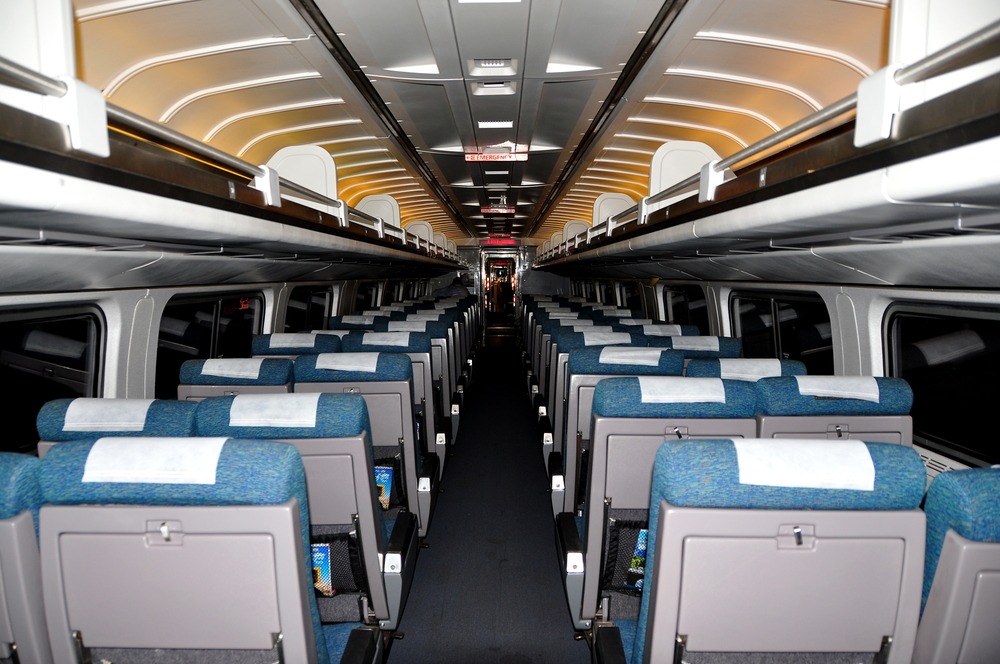

Thinking like an economist about travel.
Here’s what happened yesterday. A good friend called me and asked me for advice. I often hesitate to give advice but I don’t hesitate to ask lots of questions. At the end, usually the person can figure it out for himself or come close with a little intellectual nudging.
He’s a fellow academic and I don’t want to reveal his identity so I’ll call him Fred. Fred took Amtrak last week from California to his boyhood home in the East for Christmas. He found that he got a lot of work done on a paper he’s working on: at least 3 hours a day of intense uninterrupted work over a 2.5 day trip.
He’s trying to decide whether to come back to California by train or fly. We talked through COVID-19 risks first and he’s convinced that they’re comparable. (When he took the train, it was 40% full and he had his own compartment. That tilts in favor of the train, but the train takes about 9 times as long as the airplane, which tilts in favor of the airplane.) I had no expertise on those risks and so I didn’t offer any. The point is that he was convinced that the risks are roughly equal and I had no basis for contradicting that.
The next question I asked Fred is whether if he got back to California early (by taking the plane) he could work at least 3 hours a day at home. He said he probably couldn’t work nearly as effectively because the absence of distractions on the train was something he couldn’t easily replicate where he lives.
In short, he would be more productive if he took the train.
I then asked whether getting the work done on the train on the way back to California creates some momentum in his work that helps him when he gets home. He said it does.
There was one main issue left: relative fares. The one way airfare is about $500 and the Amtrak fare is a whopping $1,300.
“$1,300 is a lot of money,” he said.
I replied that the relevant number was not $1,300 but $800 because that’s the increment in outlay from taking the train. He got the point immediately and then said, “See? That’s why I like talking to you. You give me clarity.”
“Moreover,” I said, “maybe you could deduct the train fare. Are you visiting fellow academics back there? If not, make sure you do. Take one or a few for coffee to talk about your work, and socially distance. If you can justify deducting the fare, the real difference in monetary cost to you is (1- t)* $800, where t is your marginal tax rate. I happen to know that your marginal tax rate on your Schedule C income is about 40%. So the real difference in cost is $480. I know your net worth quite well and you can easily afford this. But even if you can’t deduct, $800 is not a large number for you relative to your net worth. Is your added productivity worth at least $800?”
He decided to take the train.

READER COMMENTS
Patrick T Peterson
Dec 23 2020 at 1:14pm
Another great example of why your book is highly beneficial: https://www.goodreads.com/review/show/1900462917
William Anderson
Dec 23 2020 at 1:31pm
Wait! Wasn’t there a movie about this starring Steve Martin and John Candy?
David Henderson
Dec 23 2020 at 1:43pm
Haha. I almost titled it “Planes, Trains, and Automobiles.” Fun movie, particularly a propos during the holiday season. I miss my fellow Canuck, who died so young.
Philo
Dec 23 2020 at 1:34pm
Sounds like he needs to reduce distractions at home. If I were working, I’m sure I’d get more done at home than on a train.
john hare
Dec 23 2020 at 5:00pm
That is how I was thinking. It seems out of joint that he can accomplish more in 2 extra days at 3 hours a day on a train than having those full days available in the comfort(?) of his own home.
Jon Murphy
Dec 23 2020 at 8:14pm
Likely he already has reduced them as much as possible.
Paul
Dec 23 2020 at 4:06pm
I get more done on an intercontinental plane flight than a day at the office or work-from-home. 12-14 hours with no distractions. Of course, train isn’t an alternative to Tel Aviv or Shanghai.
Speed
Dec 23 2020 at 4:22pm
If your friend’s train is travelling around or through Chicago, he might be delayed. There is a bodacious snow storm brewing in the Great Plains, headed toward the upper Midwest. A non-stop flight would fly over or around such a storm,
If the train was delayed and the railroad was run by an smart businessman or woman, the railroad would charge your friend for the additional hours or days of peaceful accommodations.
Speed
Dec 24 2020 at 7:22pm
Update: Capitol Limited Train 29 … currently operating 4hr 10 min late (Washington DC to Chicago).
Service Alerts & Notices | Amtrak
Hope that’s not his train. The last time I rode it (also four hours late) we had to run to our connecting train out of Chicago rather than enjoying a nice lunch in town.
Vivian Darkbloom
Dec 23 2020 at 5:14pm
In order to deduct his travel expenses, your friend would need to establish that the *primary purpose* of the trip from California (his tax home) to the East was for business purposes. Based on the facts you presented, his case does not come close to meeting that standard. On the other hand, he probably could deduct half the cost of that cup of coffee if it truly was a business meeting.
I understand, of course, that fraudulent business expense deductions are quite common and most people get away with them for the simple reason that the IRS doesn’t audit a very large number of returns. If your friend’s return is one of the few selected for audit, I’m afraid that he would likely need to add one or more accuracy related penalties, such as negligence and substantial underpayment penalties, as well as interest on the additional amount due, to the cost of that trip.
If we assume that the cost of the trip is legitimately deductible or that your friend doesn’t lose the audit lottery, then the deductible expense is from his home to the place of business and return, not simply the trip back to his home…
https://www.law.cornell.edu/cfr/text/26/1.162-2
Chris H
Dec 23 2020 at 6:06pm
Apparently, some people are using this strategy every work day!
https://nypost.com/2020/12/09/nyc-workers-using-lirr-cars-as-quiet-cheap-office-spaces/
If it’s working well for him across country, maybe he should start taking AmTrak from the Bay Area to Sacramento (and right back the other way) a few days a month. (Just guessing on geographic location.)
Billt
Dec 24 2020 at 8:16am
If Fred can deduct the cost of the train ride he could also deduct the cost of the airplane ticket. You need to take this into account when finding the marginal cost. This results in a small increase in the marginal cost of the train ride.
David Henderson
Dec 24 2020 at 3:25pm
I did take it into account. Go back and check my reasoning and see if you can see how.
Billt
Dec 24 2020 at 6:13pm
The cost of the train ride after taxes is 0.6*1300 = 780
The cost of the airplane ride after taxes is 0.6*500 = 300
780 – 300 = 480
I stand corrected! If you have time in early April would you mind going over my taxes?
David Henderson
Dec 24 2020 at 6:30pm
Bingo.
Re your taxes, haha.
The reason I could skip your step is that 0.6*($1,300 – $500) is the same as 0.6*($1,300) – 0.6*($500). Math is by far the most valuable skill I learned in school, with touch-typing a close (or maybe distant) second.
TMC
Dec 24 2020 at 10:55pm
I think I’d fly home, and spend the next two days in a hotel, free from distractions. Likely cheaper overall, and I would assume the hotel would be better from a distraction perspective than the train is.
Jose Pablo
Dec 26 2020 at 10:30am
The whole reasoning fails to take into account that the main reason why your friend would not be as productive spending two more days in his home town is because we will be doing things more valuable to him (and to others like his relatives and/or friends).
My parents would be far worse off if I spend two days in a train instead of being with them (I like to think), the same applies to old friends (including old girlfriends … I think).
Comments are closed.